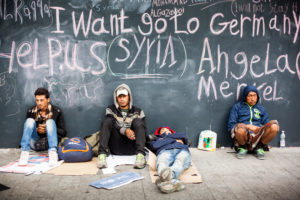EU WATCH OPINION: Developing a long-term vision on integration is in the EU’s best interests
Twenty-three million, an estimated 5 percent of the European Union’s nearly 450 million residents, were born outside of its borders. This figure is perhaps most noticeable in culture and sports. England’s Euro 2020 squad, which reached the final for the first time ever, only had three players that did not have a migration background. And at the Eurovision Song Contest in May, two refugees took part. One of them was the Congolese-born singer Tusse (Tousin Chiza), who represented Sweden.

Tusse, an immigrant from Congo, represented Sweden at the European Song Contest in Rotterdam (photo: Shutterstock)
The health sector is another good example for the importance of migrants. Where would Europe be today without Uğur Şahin and Özlem Türeci, the couple that co-founded BioNTech, make of arguably the most successful vaccine against Covid-19? These children of Turkish immigrants arrived in Germany at a young age. Without them and without the many doctors and nurses from third countries, Europe would have fared much worse in the Corona crisis.
SUCCESS STORIES Despite obvious success stories, immigration remains a controversial subject in most European countries. Fears are widespread that migrants pose a threat, that they are incompatible with the European way of life, difficult to integrate, and of course that they take away people’s jobs and put pressure on wages.
Lack of integration is not only of concern with respect to recent arrivals. Some second and third generations of families clearly have trouble finding their place in society. Some fail to embrace their host country, stay within their own communities and become a bone of contention, with calls for a tougher stance on immigrants magnified by populist forces.
Gastkommentar: Europas Migranten sind Teil der Lösung https://t.co/1LjO2b6vIp
— Alois Schlachter (@AloisSchlachter) August 14, 2021
At the same time, crucial questions remain: Can Europe, seen around the world as a fortress of humanity, turn a blind eye to the suffering of people for fear of being “overrun” by immigrants? Can it afford to see human beings kept in camps and inhumane conditions over a prolonged period of time and thus allow its values to be eroded? Does the EU accept pushbacks of asylum seekers at its external borders, with its border and coastguard force possibly complicit in such actions? And should Europe collaborate with authoritarian regimes to manage migration flows?
EDUCATION There are no simple answers. Further debate is needed. Yet for a long time, the focus of EU decision-makers has been on reducing the influx of new migrants. Of a lesser interest was the question of integration of those who are already here. Success on this front depends to a great extent on migrants having access to good education and some perspective for the future. While that may sound straightforward, in practice it is not. Often, host countries provide initial help for newcomers, but fail to follow-up over the longer term.
Integration is largely left to national jurisdictions. While the EU institutions excel at providing non-binding recommendations and funding projects, they do not determine integration policies. That remains the prerogative of member states, which refuse to give Brussels a broader mandate out of fear that immigration policies could be soon dictated by Eurocrats.
What migrants bring to Europe:https://t.co/VoULgGKtae
— Jeff Crisp (@JFCrisp) August 15, 2021
However, there is good reason why the EU should become more involved: the economy. People are becoming older – a reason to celebrate, of course, but one that comes at a cost. Over the past decade, the average life expectancy of Europeans has risen by 2.7 years. That creates problems not only for retirement pensions, but also for living standards. Qualified labour is becoming scarce in some areas, the health sector is just one example.

Photo: Shutterstock
There is of course another reason for that: the economy. Whether we like it or not, Europe’s ageing population – albeit a cause to celebrate – has an increasing cost. The median age in the EU is growing by around four months every year. Over the past ten years, it grew by 2.7 years. That creates problems not only for retirement pensions, but also for living standards, as qualified labour is becoming scarcer.
At the present birth rate, Europe’s existing population cannot solve this problem on its own. Many argue that migrants are needed to rejuvenate the workforce and to secure the longer-term future. Moreover, EU’s geopolitical weight on the international scene could diminish unless the basis for its long-term growth is secured. However, critics say that bringing in migrants to replenish the European workforce is not only bad for their countries of origin but creates new problems with respect to integration and inclusion.
Educating and training immigrants, imbuing them with democratic values will turn them into valued citizens of their new countries – or into ambassadors of Europe in their countries of origin if they (have to) return there. This in turn will undoubtedly strengthen Europe’s position on the international scene – economically and politically.
DANGERS Fears among the population about radical migrants, even terrorists, infiltrating Europe must be taken seriously. Citizens do not want foreign conflicts to be imported here, or their freedoms be eroded. The goal must therefore be for immigrants to become active in the democratic politics of their host countries. Encouraging their involvement at grassroot level ought to be part of a good integration policy and should be as important as integrating them on the football pitch.
In recent years, the EU expended a lot of energies on stopping people coming to shores instead of facilitating the integration of those who are already here – or helping those willing and obligated to return to their countries of origin in order to make a fresh start there.

Asylum seekers in Budapest 2015 (photo: Shutterstock)
Reversely, some immigrants do not embrace their new countries of residence, stay within their diaspora communities, refuse to learn the local language and by consequence to be absorbed into society. The dilemma is that on the one hand, migrants are often not made to feel welcome in their host countries, but that, on the other hand, some fail to recognise the customs and laws of their host countries.
Some even continue to be active in the often-problematic domestic politics of their countries of origin. A clear integration policy on the European level, with rights but also obligations and restrictions, would be in Europe’s interest, as well as in that of the migrants.
However, currently, Europe’s energies and resources seem to be focused primarily on border protection, on preventing irregular immigration from the Middle East, and on burden-sharing for new arrivals. In 2020, the figures of newcomers were fairly low, largely because of travel restrictions imposed during the Corona pandemic. This is certainly a legitimate concern, not only because Europe’s politicians need to address voters’ fears of a repeat of the 2015 refugee crisis and deal with authoritarian rulers in the neighbourhood who use refugees as a political weapon for political blackmail.
However, a bigger issue is being neglected somewhat: How to lift the full potential of those immigrants who are already here, and how make sure that they are being integrated into European society. A shift in emphasis is needed. What if migrants are not merely regarded as a vexatious problem, but as part of the solution? An EU-wide vision on integration would be in Europe’s self-interest.
Author: EU Watch – Michael Thaidigsmann.
A shorter version of this article was published by Deutsche Welle, in several different languages.






